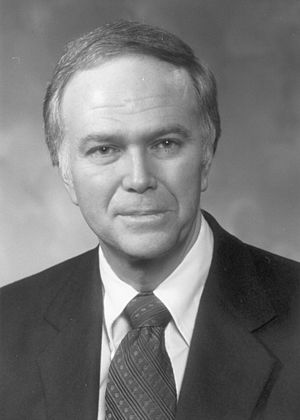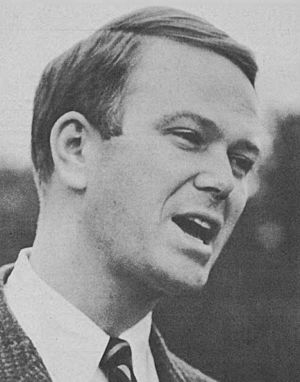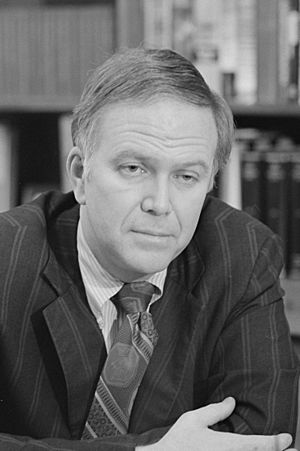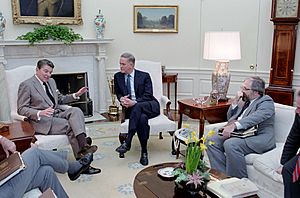Bob Packwood facts for kids
Quick facts for kids
Bob Packwood
|
|
|---|---|
 |
|
| Chair of the Senate Finance Committee | |
| In office January 3, 1995 – October 1, 1995 |
|
| Preceded by | Daniel Patrick Moynihan |
| Succeeded by | William Roth |
| In office January 3, 1985 – January 3, 1987 |
|
| Preceded by | Bob Dole |
| Succeeded by | Lloyd Bentsen |
| Chair of the Senate Commerce Committee | |
| In office January 3, 1981 – January 3, 1985 |
|
| Preceded by | Howard Cannon |
| Succeeded by | John Danforth |
| United States Senator from Oregon |
|
| In office January 3, 1969 – October 1, 1995 |
|
| Preceded by | Wayne Morse |
| Succeeded by | Ron Wyden |
| Member of the Oregon House of Representatives from the 6th district |
|
| In office January 14, 1963 – January 3, 1969 |
|
| Preceded by | Multi-member district |
| Succeeded by | Multi-member district |
| Personal details | |
| Born |
Robert William Packwood
September 11, 1932 Portland, Oregon, U.S. |
| Political party | Republican |
| Spouses |
Georgie Oberteuffer
(m. 1964; div. 1991)Elaine Franklin
(m. 1998) |
| Children | 2 |
| Education | Willamette University (BA) New York University (JD) |
Robert William Packwood (born September 11, 1932) is a retired American lawyer and politician from Oregon. He served as a member of the United States Senate from 1969 to 1995. He was a member of the Republican Party.
He resigned from the U.S. Senate in 1995. Since the death of Fred R. Harris in November 2024, Packwood is the earliest-serving living U.S. senator. He is also the last living former U.S. senator who started his term in the 1960s.
Contents
Early Life and Education
Robert William Packwood was born in Portland, Oregon. He graduated from Grant High School in 1950. In 1954, he earned his degree from Willamette University in Salem.
Packwood is the great-grandson of William Packwood. William Packwood was the youngest member of the Oregon Constitutional Convention of 1857. Bob Packwood showed an interest in politics from a young age.
During his college years, he was active in Young Republican groups. He also worked on political campaigns. One notable campaign was for Mark Hatfield, who later became a governor and U.S. Senator.
Packwood received a special scholarship to New York University's Law School. There, he won national awards in law competitions. He was also elected student body president. After graduating in 1957, he became a lawyer and practiced law in Portland.
Starting a Political Career
In 1960, Bob Packwood became the Chairman of the Multnomah County, Oregon, Republican Central Committee. This made him the youngest leader of a major political party in a big city in the country. In 1962, he was elected to the Oregon House of Representatives. He was the youngest member of the Oregon Legislature at that time.
His campaign was very effective, with many volunteers going door-to-door. They handed out flyers and put up lawn signs everywhere. Because his own campaigns were so successful, Packwood was chosen to help other Republican candidates. He organized a group that found new Republican candidates for the Oregon House. They also taught them his "Packwood-style" campaigning methods. The success of these candidates helped Republicans take control of the Oregon House. Oregon was the only state where Republicans had a big victory in 1964.
Packwood served in the Oregon House of Representatives from 1963 to 1968. In 1965, he started the Dorchester Conference in Seaside, Oregon. This is an annual political meeting on the Oregon coast. It brings together Republican leaders and citizens to talk about important issues. They also pass resolutions on these topics. It started as a place for more liberal political ideas. Now, it is an annual event for Oregon Republicans to connect.
Serving in the U.S. Senate
In 1968, Packwood ran for the U.S. Senate in Oregon. He was the Republican candidate against the Democratic Senator Wayne Morse. Morse had been elected as a Republican before, but then switched parties. Packwood was not very well known, and many thought he had little chance to win. However, after a debate with Senator Morse, Packwood was seen as the winner. After a close vote and a recount, Packwood won by 3,500 votes. He became the youngest senator at that time.
Packwood was re-elected four more times: in 1974, 1980, 1986, and 1992. His voting record was considered moderate. He supported rules for gun owners and civil rights laws. He voted for the bill that made Martin Luther King Jr. Day a federal holiday. He also supported the Civil Rights Restoration Act of 1987.
Packwood sometimes disagreed with President Richard Nixon. He voted against some of Nixon's choices for the Supreme Court of the United States. He also voted against some of Nixon's military and transportation plans. He was the first Republican senator to support the idea of removing President Nixon from office. This effort was not successful. In 1973, he told Nixon that people no longer trusted his administration.
Packwood played a big part in creating the Hells Canyon National Recreation Area. He sponsored a bill that protected Hells Canyon, which is the deepest river gorge in North America. This area became a 652,488-acre (2,640.53 km2) National Recreation Area. Environmental groups also liked his support for solar energy and bike paths.
He was also interested in making rules simpler for businesses. In the late 1970s, he strongly supported making trucking rules less strict. He was known as a "persuasive spokesman" for these changes.
Packwood was also a strong supporter of Israel. He opposed a sale of F-15 fighter jets to Saudi Arabia during President Reagan's time.
He is most remembered for his role in the 1986 tax reform. At that time, he was the chairman of the Senate Finance Committee. President Ronald Reagan had suggested tax reform in 1984. Packwood helped create a new tax plan. This plan would increase taxes for businesses and lower personal income taxes by about the same amount.
USA Today rated Packwood's debating skills as A+ in 1986. He was skilled at both passing and stopping bills. He helped stop President Clinton's health care bill in 1993. He was known for being stubborn. In 1988, he was carried into the Senate Chamber by police for a vote on campaign finance reform.
Resignation from the Senate
Packwood's political career faced challenges starting in November 1992. A Washington Post story shared claims about his behavior. The story was published after the 1992 election. Packwood had denied the claims. He won his election against Les AuCoin, but it was his closest race in 25 years. Eventually, more women came forward with concerns.
The United States Senate Select Committee on Ethics investigated Packwood's conduct. The committee looked into his actions and found concerns. The chairman of the Ethics Committee, Republican Senator Mitch McConnell, spoke about Packwood's behavior. He said Packwood had a "habitual pattern of aggressive... advances." He also mentioned that Packwood had changed parts of his personal diary. Packwood himself had described these parts as "very incriminating information."
On September 7, 1995, the committee strongly recommended that Packwood be removed from the Senate. The next morning, the committee released its findings. With pressure from both political parties, Packwood announced his resignation from the Senate. He said he was "aware of the dishonor that has befallen me" and that it was his "duty to resign." Democratic Representative Ron Wyden won Packwood's seat in a special election.
Four years later, during discussions about removing President Bill Clinton from office, Senator McConnell spoke about Packwood's situation. McConnell said that Republicans knew they might lose Packwood's Senate seat if he was forced out. However, McConnell stated that he and other Republicans felt it was a choice between "retain the Senate seat or retain our honor."
After the U.S. Senate
Soon after leaving the Senate, Packwood started a lobbying firm called Sunrise Research Corporation. A lobbyist is someone who tries to influence lawmakers on behalf of a group or company. The former senator used his knowledge of taxes and trade. His experience as a former Senate Finance Committee chairman helped him get important contracts. He worked with clients like Freightliner Trucks and Marriott International. He also worked with the now-closed Northwest Airlines.
One of his projects was helping to repeal the estate tax in the United States in 2001. In 2015, Packwood returned to the Senate as a witness. He spoke to the United States Senate Committee on Finance, which was again looking at tax reform. He and Senator Bill Bradley talked about the Tax Reform Act of 1986.
See also
- List of United States senators expelled or censured
 | Valerie Thomas |
 | Frederick McKinley Jones |
 | George Edward Alcorn Jr. |
 | Thomas Mensah |




